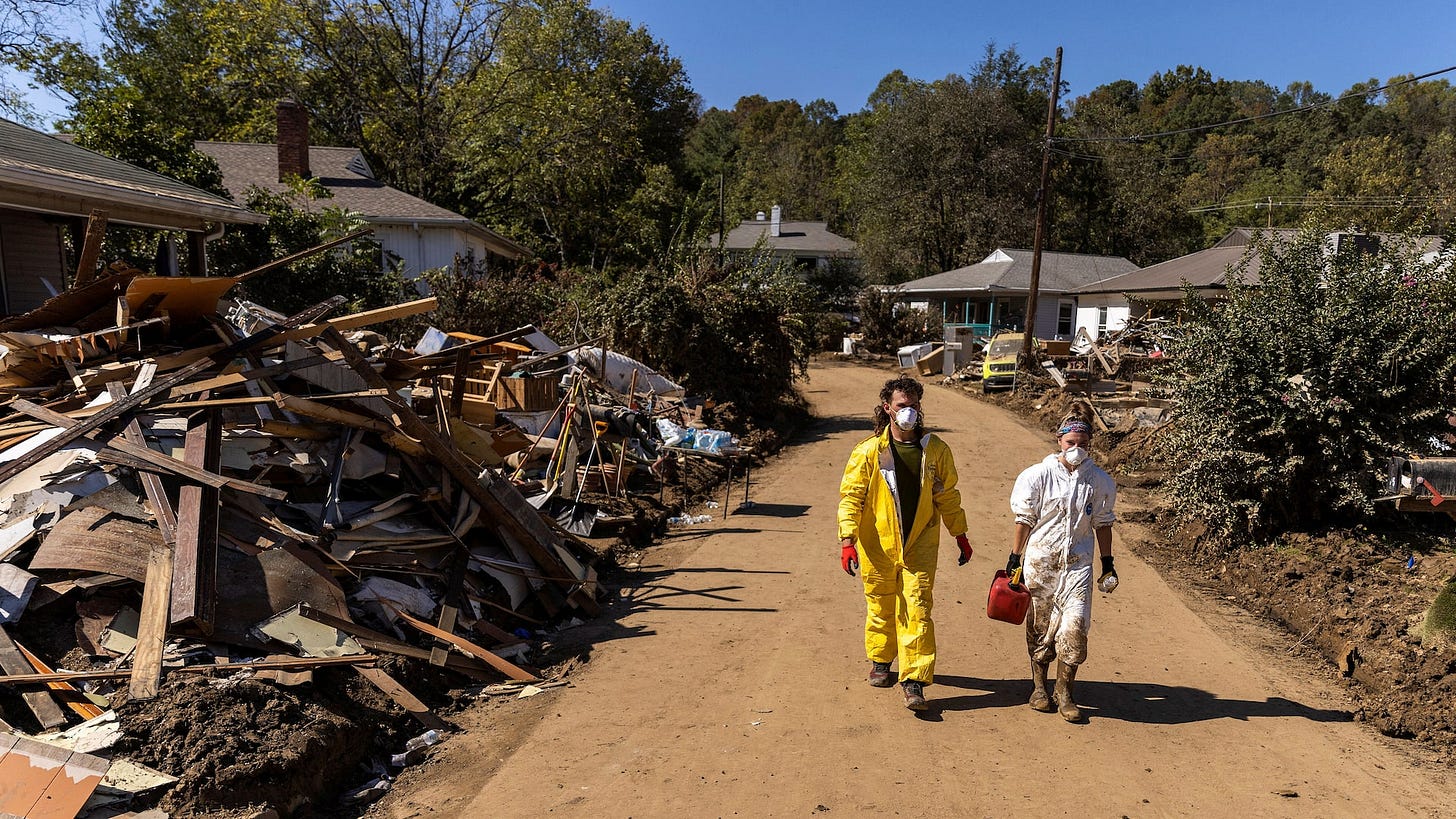COMMENTARY: Disinformation and a Devastated Appalachia
A reflection on the disinformation campaign surrounding aid to the people affected by Hurricane Helene
Editor’s Note: This piece was authored and presented at an event at the First State Capitol in Wheeling, W.Va., on Oct. 15, 2024. During the event, community members and speakers raised $400 for World Central Kitchen and their work supporting the people of western North Carolina. If you would like to support WCK, use this link. If you would like to inform me of your donation, I will let the event organizers know so they can add it to their total.

As powerful Hurricane Helene made landfall on Sept. 26, all eyes naturally turned toward its projected landfall in the Big Bend of Florida. Days before, national weather service stations in the Carolinas warned of a potentially historic deluge of water flooding the hollers of the heart of Appalachia. Unfortunately, those predictions came true.
While the streams and rivers rose in the rugged ridges and valleys of North Carolina, and as people watched their lives wash away, not a moment was spared before human tragedy was spun into political gain. Communities cut off from the world, struggling to get food and water, were used as props by the worst among us to push their agendas.
For Appalachia, this isn’t novel. Moneyed interests, urban elites, and professional politicians have used the real struggles of our people to stereotype, condemn, infantilize, and profit from us.
When our laborers went on strike for better working conditions, they were labeled traitors to the nation. When our people struggled, and continue to struggle, with poverty, addiction, and health, they were told they deserve it based on the politics of their state government. When our young move to other lands, they’re called backwards hicks and hillbillies.
While Appalachians are often the objects of derision by the rest of the nation, this moment is particularly offensive. Before flood waters finished their dramatic rise, and before folks could take stock of what they lost, presidential candidates, politicians, pundits, and people across the country used the moment to spread conspiracy theories, disinformation, and division.
Whether it be claims that the Federal Emergency Management Agency was using eminent domain to acquire entire towns, or that the Biden administration diverted a billion dollars from disaster relief to migrants, or that a political party created the storm to affect those who do not support them, these lies serve the same purpose–sow distrust, divide, and try to score a win in November.
It’s a disgusting show of the worst of our nation. In the days after Helene’s hit, the media was forced to split its focus from the victims to dedicate time to dispelling rumors. Organizations that should be solely focused on providing aid had to devote resources to assuaging the fears of people who were lied to by those they trust. In the end, as always, Appalchians suffer while others take advantage of our plight.
At some point, our situations must change–if not for our own sake, then for the sake of our children, who we hope continue to call these mountains home. The powers that be cannot be allowed to profit from us while pushing us down. There needs to be real consequences for the actions of people, like the former president, who use our pain for political gain.
Where do we go from here? First, you don’t reward liars with job promotions. Any political movement willing to use a natural disaster to spread disinformation should be shunned from polite society. This deceit not only harms the people experiencing tragedy today. Future victims of inevitable tragedies will be harmed if they choose to not listen to expert recommendations because their cherished political candidate claimed conspiracy. If you believe the federal government will take your property if it’s flooded, will you leave, even if you’re in a mandatory evacuation zone?
Second, Appalachia needs to take local government more seriously. Attending meetings, voting, reading, speaking–all tools that every person has to affect change. Whether these actions are used to lobby for resiliency planning to combat future storms, push out so-called leaders who spread disinformation, or to ensure your community has an effective spokesperson to fight for the resources you need before, during, and after tragedy strikes, a hyper-local focus is one of the best ways to build prosperous, prepared communities.
Lastly, our nation must do better at dispelling dishonesty before it can have national impacts. Disinformation is quickly becoming a part of our national fabric, but it hasn’t fully ingrained itself just yet. When our grandmothers and grandfathers, mothers and fathers, brothers and sisters, friends, coworkers, or neighbors, pass off lies as facts, people need to push back. Otherwise, at some point, fact and fiction will be determined by what political camp you place yourself in.
Appalachians are a resilient people. The people devastated by Hurricane Helene will recover and rebuild, no doubt about it. Hopefully, this region will use this time to improve. While others will use our struggles for their gain, Appalachia must organize a unified voice to effectively fight back.
We do best when we look out for each other. May we use this moment to remind ourselves of that fact, and focus on building resilient communities that lobby for our best interests.

